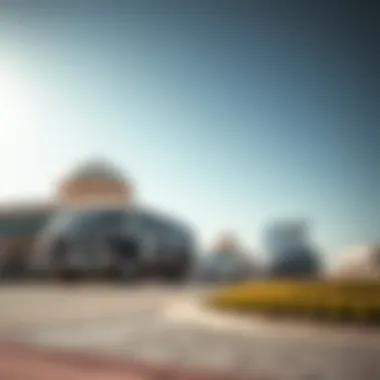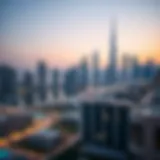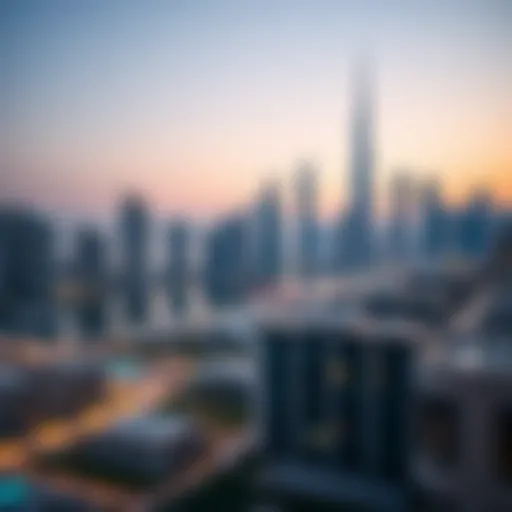The Dubai Project Landscape: Trends and Insights


Intro
In recent years, Dubai has transformed into a global hub of opulence and innovation, particularly within its real estate market. With a blend of towering skyscrapers, luxurious villas, and expansive commercial spaces, the landscape of property investment in Dubai is as dynamic as it is enticing. A closer inspection reveals that beneath the surface glamour lies a complex interplay of trends, opportunities, and challenges that investors and homebuyers must navigate.
This article serves as a comprehensive guide to understanding the various elements that shape Dubai’s project landscape. A pragmatic analysis is essential for anyone considering involvement in this lucrative sector. From current real estate trends and future forecasts that indicate shifting tides, to an exploration of residential and commercial properties, readers will gain insights that are vital for informed decision-making. Whether you're an investor eyeing the next potential goldmine or a homeowner seeking the perfect abode, having a nuanced understanding of the market is imperative.
As we delve into specific aspects of the property market, it’s important to highlight the relevance of each trend discussed. This dialogue is not only about numbers and statistics; it’s about grasping the underlying currents that define investment landscapes. Let's embark on this enlightening journey through Dubai's property sector.
Market Trends
Current Real Estate Trends in Dubai
Dubai's real estate market, much like the city itself, is ever-evolving. Currently, one of the most noteworthy trends is the shift towards sustainability. Developers are increasingly incorporating green building practices. This aligns not only with global standards but appeals to a growing demographic of environmentally-conscious investors.
Moreover, the demand for multi-functional spaces has risen, especially post-pandemic. Properties with both living and working amenities gain favor as more people adapt to hybrid work models. Insights into market dynamics reveal a noticeable uptick in mid-range housing. Investment in this segment tends to resonate with local and expatriate families seeking more affordable options without compromising on quality.
Future Forecasts for the Dubai Property Market
Looking ahead, analysts predict that the Dubai real estate market will continue to gain momentum. The government's supportive policies, such as long-term visas and ownership rights for foreign investors, add a layer of attractiveness. According to forecasts, there could be potential growth in areas such as Dubai Creek Harbour and the Dubai Marina.
However, potential investors must stay vigilant. Economic factors, including fluctuations in oil prices and global market instability, can impact property values. Assessing market conditions and emerging trends remains pivotal for navigating this bustling sector.
"Understanding market trends is not just about looking at today but also about envisioning tomorrow's possibilities."
Property Types
Residential Properties: Overview and Insights
Dubai’s residential property scene comprises a diverse mix of villas, apartments, and townhouses. Each type caters to different demographics, and understanding these nuances is crucial. High-end developments in areas like Palm Jumeirah are synonymous with luxury living. However, neighborhoods like Jumeirah Village Circle offer more competitive pricing for those seeking quality at a reasonable rate.
Furthermore, community amenities play a vital role in attracting buyers. Proximity to schools, shopping centers, and parks significantly enhances the appeal of residential areas. Investors looking for rental returns should consider properties in areas with high demand among expatriates and locals alike.
Commercial Properties: Opportunities and Challenges
Commercial real estate in Dubai offers vast potential, from office spaces to retail outlets. The ongoing trend toward co-working environments has boosted the demand for flexible office spaces, especially in areas like Business Bay. However, when venturing into commercial investments, one must also be aware of market saturation in certain sectors, particularly retail, where online shopping continues to gain dominance.
Ocean-facing properties are also garnering attention due to their desirability of views. Nevertheless, prospective investors must conduct thorough market research to mitigate risks associated with oversupply and changing consumer preferences.
Through comprehensive analysis, this article will equip readers with the insights needed to make informed decisions in Dubai’s vibrant real estate sector, ultimately paving the way for successful investments and home purchases.
Overview of Dubai's Real Estate Market
The Dubai real estate market occupies a central role in both the economic structure of the UAE and the global property scene. Understanding this market isn't just about numbers and statistics; it's about grasping the dynamic forces shaping trends, investment potential, and even societal changes within this vibrant city. Investors and homeowners alike need a grounded perspective on this landscape, whether they're looking to invest, purchase a home, or simply analyze the market.
Historical Context
To appreciate the present, one must delve into the past. Dubai's real estate sector has undergone several transformative phases. In the early 2000s, the government introduced freehold ownership, particularly in areas earmarked for development. This move attracted international buyers, marking the beginning of a property boom. Skyscrapers began to dot the skyline, including iconic structures like the Burj Khalifa. However, this rapid expansion was not without its setbacks. The global financial crisis of 2008 brought a lull, pushing property prices down and causing many developers to shelve their ambitious projects.
In recent years, the market has rebounded, fueled by a growing expat population, favorable foreign ownership laws, and an ever-burgeoning tourism sector. This reset phase has laid a foundation for sustained growth, highlighting the resilience of Dubai's property market. In this context, historical patterns can provide insight into possible future trends, pointing investors towards smarter choices and expert predictions.
Current Market Status
As of now, the market is striking a balance between competitiveness and sustainability. Following a post-pandemic recovery, there’s been a noticeable surge in demand across various sectors, including luxury residences and commercial properties. According to recent reports, property transactions soared in 2022 and are expected to keep their momentum. Despite the world facing various economic uncertainties, Dubai's real estate has remained a beacon, attracting serious international investors and high-net-worth individuals.
There’s also a noteworthy shift towards sustainability and innovative building practices, influenced by global trends and local regulations. Developers are now focusing on eco-friendly units, incorporating smart technologies, and facilitating community living - aspects that cater to modern buyers' preferences. Overall, the market today reflects a vibrant ecosystem where technology and lifestyle demands intersect.
Key Players in the Market
Identifying the critical players in Dubai's real estate scene is critical for understanding market dynamics. This landscape includes a medley of local and international developers, real estate agents, and investment firms, each contributing to the sector's growth. Notable key players include Emaar Properties, known for landmark projects like the Dubai Mall and Dubai Marina; Aldar Properties, contributing extensive residential sector projects; and Damac Properties, renowned for high-end luxury developments.
Moreover, real estate agencies like Betterhomes and Allsopp & Allsopp play an integral role, acting as gateways for expats and investors looking to explore opportunities. These players foster competition, driving innovation and better service provision, which ultimately benefits consumers.
The involvement of regulatory bodies can't be overlooked either. Authorities such as the Real Estate Regulatory Agency (RERA) enforce transparency and governance, assuring potential investors of a secure environment in which to engage. Understanding the interplay between developers, agents, and regulatory bodies helps demystify the complexities of Dubai’s real estate market, paving the way for strategic investment decisions.
Investment Opportunities in Dubai
Understanding the investment opportunities in Dubai is pivotal for both seasoned investors and newcomers. The city's real estate sector stands as a beacon of potential, largely due to its strategic location, robust economy, and favorable regulations for foreign ownership. In this section, we'll explore various property types, land emerging areas, and the market trends driving the investments.
Property Types
Luxury Residences
Luxury residences in Dubai are not just living spaces; they symbolize a lifestyle of opulence and exclusivity. High-rise apartments in areas like the Burj Khalifa or waterfront villas in Palm Jumeirah exemplify the heights of architectural brilliance. The key characteristic of luxury residences is their amenities, which often include private pools, gyms, and around-the-clock concierge services. These features make them highly desirable, reflecting a commitment to sophistication and comfort.
One unique feature of luxury residences is their proximity to world-class attractions, dining experiences, and cultural hubs. However, it's also crucial to consider the high ownership costs and potential depreciation in certain areas. Understanding these aspects is vital for anyone looking to invest in this category.
Commercial Properties


When discussing commercial properties, Dubai unfolds a landscape brimming with opportunities. Shopping malls, office spaces, and retail outlets all contribute significantly to the region’s economic fabric. The rise of e-commerce has prompted many investors to pay attention to logistics and warehousing facilities, highlighting the shifting commercial trends in response to market demands.
The key characteristic of commercial properties is their potential for higher returns on investment compared to residential options. Many businesses seek prime locations in bustling districts, making them adaptable to the ever-evolving market. However, the economic climate and regulatory challenges can pose risks that investors must navigate carefully.
Affordable Housing
Affordable housing has emerged as a crucial focus within Dubai’s real estate landscape, particularly in light of rising living costs. The demand for budget-friendly options is soaring, as many residents look for sustainable living solutions without compromising on quality. The key characteristic here is accessibility; affordable housing is often strategically located near transport links and essential services, making them attractive for a wide range of buyers.
A unique aspect of affordable housing is its ability to foster communities. Developers are increasingly incorporating communal spaces and amenities aimed at enhancing residents' quality of life. Still, potential investors should tread carefully as the profit margins may not be as substantial as in luxury or commercial sectors.
Emerging Areas
Emerging areas in Dubai like Dubai South and Al Furjan are catching the eye of savvy investors. These neighborhoods show great promise, often offering better value as they develop infrastructure and community amenities. Early investors can benefit from lower entry prices and the chance to ride the wave of appreciation as these regions mature.
Market Trends Driving Investment
Several trends are shaping the investment landscape in Dubai. The move towards sustainability and eco-friendly developments is one crucial trend, reflecting a broader global shift. Buyers are now looking for energy-efficient properties, which can enhance marketability and long-term value. Moreover, investors are increasingly swayed by positive economic indicators, such as the UAE’s strategic initiatives to boost tourism and alleviate excess property supply.
As the Dubai property market continues to evolve, recognizing the underlying trends can keep investors ahead of the curve and optimize their investment strategies.
In summary, the investment opportunities in Dubai provide a diverse landscape. Which path an investor chooses often hinges on their individual goals and risk appetite. It's essential to conduct thorough market research and consult with regional experts to make informed decisions.
The Role of Technology in Real Estate
The integration of technology in real estate is more pivotal than it's ever been. In an environment marked by rapid change, technology not only enhances operational efficiency, it also transforms how investors, homebuyers, and agents engage with properties. From the way homes are built and sold, to how users interact with their living spaces, the role of technology is expansive and critical.
Smart Home Integration
Smart home technology has become a staple in modern real estate. Homes equipped with systems such as Nest for temperature control or Philips Hue lights for ambience offer convenience and energy efficiency. These systems allow residents to manage aspects of their homes remotely.
- Benefits:
- Enhances security through smart locks and surveillance systems.
- Increases energy efficiency, leading to savings in utility bills.
- Provides comfort and convenience with automated systems.
Moreover, homebuyers are increasingly considering smart features as essential, often demanding them in new builds or major renovations. This shift not only boosts property values but also increases marketability. Developers who incorporate these technologies can attract a broader audience, appealing to tech-savvy buyers who prioritize innovation.
Proptech Innovations
The rise of property technology, commonly known as proptech, encapsulates a range of software and tools designed to optimize the property market. Innovations in this space help streamline both residential and commercial real estate transactions. Examples include virtual reality tours that allow prospective buyers to view properties without leaving their homes and blockchain technology that ensures security and transparency in real estate transactions.
- Key Innovations:
- Virtual tours create immersive viewing experiences.
- AI-driven analytics provide insights into market trends, helping investors make informed decisions.
- Platforms that facilitate real estate transactions such as Zillow and Redfin enhance accessibility to property listings.
With these tools, the buying and selling process becomes swifter and more efficient. Homebuyers and investors alike benefit from data-driven insights, allowing them to discern market trends quicker than through traditional methods.
Digital Marketplaces
Digital marketplaces have reshaped the way real estate is bough and sold. Websites like Zillow and Realtor.com have revolutionized property searches, allowing users to filter results based on their specific needs. This evolution comes with several advantages.
- Advantages of Digital Marketplaces:
- Transparency in pricing and availability.
- User-friendly navigation makes finding desirable properties easier.
- Connectivity between buyers and sellers, agents, and even financing options.
As these platforms continue to grow, they facilitate an open dialogue between parties involved in the transaction. Investors can weigh multiple options seamlessly, while sellers gain broader exposure than traditional methods would offer.
"Technological advancements in real estate not only refine the buying experience but also dictate future trends in property investment and home living."
In summary, technology enhances every aspect of the real estate sector in Dubai. Whether it’s incorporating smart home features, utilizing proptech innovations, or leveraging digital marketplaces, every facet contributes to a more dynamic and efficient economy. Investors and homeowners who understand and adapt to these technological advancements are likely to be one step ahead in this rapidly changing environment.
Financing Real Estate in Dubai
Understanding how to finance real estate in Dubai is paramount for investors and homebuyers alike. The financing landscape in Dubai has evolved significantly, driven by regulatory improvements and enhanced market transparency. Knowing the available options can pave the way for successful investments, whether you aim to acquire a luxury apartment or a commercial space. Here, we delve into financing options, foreign ownership laws, and the challenges that could complicate the journey.
Types of Financing Options
Bank Mortgages
Bank mortgages represent one of the most common approaches to financing real estate in Dubai. In essence, they offer a structured loan facility, allowing buyers to secure their properties through financial institutions. One key characteristic of bank mortgages is the relatively low interest rates compared to some other regions, which makes borrowing more appealing. This option is particularly beneficial for both first-time homebuyers and seasoned investors looking to capitalize on Dubai’s dynamic property market.
A unique feature of bank mortgages includes flexible repayment terms. Buyers can often choose tenure ranging from five to thirty years, thus easing the financial burden over an extended period. However, one must consider potential downsides, such as stringent eligibility criteria and the necessity of a significant down payment, which can sometimes be as high as twenty percent. In this context, understanding your credit history and financial health becomes essential for navigating the application process smoothly.
Developer Payment Plans
Developer payment plans offer a different avenue to purchase real estate in Dubai. These plans allow buyers to pay for their property in installments during the construction phase. A key characteristic here is that buyers can often begin their payments with a small down payment and pay the balance over time, mirroring the completion milestones of the project. This approach is particularly appealing in Dubai’s fast-paced development environment, where new projects are frequently launched.
The unique feature of developer payment plans is their flexibility. Many developers offer plans with no interest or minimal charges during construction, making it easier for buyers to manage cash flow. On the downside, committing to a developer payment plan does carry risks. There might be concerns about delays in project completion, and buyers may find themselves uncertain about the timely delivery of their investment. Thus, due diligence on the developer’s track record is crucial.
Foreign Ownership Laws


For foreign investors, knowing the ins and outs of ownership laws in Dubai is vital. The UAE has made significant strides in making its real estate market more accessible to foreigners. As of now, non-residents can purchase properties in designated areas, known as freehold areas, without any restrictions. However, regulations can vary, and prospective buyers should be aware that they may need to obtain a residency visa to finalize the purchase.
Additionally, understanding leasehold arrangements is also important. While leasehold properties allow buyers to own the property for a period—often extending to ninety-nine years—full ownership is still retained by the landlord. This distinction is essential for investors to grasp as they make decisions on property purchases in Dubai.
Challenges in Financing
Financing real estate in Dubai isn’t without its hurdles. Market saturation is a growing concern, as a surge in new developments may lead to an oversupply situation, which in turn could depress property values and affect investment viability. Furthermore, ongoing regulatory hurdles can complicate financing options. Investors may find themselves navigating a labyrinth of rules, especially when securing bank mortgages or entering developers' payment plans.
Economic fluctuations also play a significant role in the financing landscape. Changes in the global economy can directly impact interest rates and the availability of loans, which could deter potential investors from making a move. Hence, staying informed about economic indicators and currency fluctuations is crucial for investors aiming to finance properties in this vibrant market.
"Navigating the layers of property financing in Dubai requires a blend of financial acumen and local market knowledge, ensuring that investors can make informed decisions."
Navigating Legal Framework
Understanding the legal framework governing real estate in Dubai is not just important; it is essential for anyone thinking about investing in this vibrant market. From property laws that define ownership rights to the various regulatory bodies overseeing developments, grasping these elements ensures that investors, homebuyers, agents, and developers can navigate this landscape effectively. A solid understanding of these complexities can also protect against potential pitfalls that may arise.
Understanding Property Laws
Property laws in Dubai are unique and distinctive compared to other global markets. The Real Estate Regulatory Agency (RERA) plays a pivotal role in defining the framework that governs property transactions. Laws revolve around concepts such as freehold and leasehold ownership. In freehold areas, foreign nationals can own property in perpetuity, while leasehold agreements generally extend for a term of up to 99 years.
It's crucial for investors to familiarize themselves with this distinction. For instance, purchasing in Jumeirah Lakes Towers allows for freehold ownership, whereas in some sectors like Dubai Marina, only leasehold acquisitions may be available. This knowledge is vital and can influence one’s investment strategy significantly. Additionally, the Strata Law regulates management of shared properties such as apartment buildings and commercial complexes, ensuring clarity in the rights and responsibilities of apartment owners, which helps prevent conflicts down the line.
Regulatory Bodies
Dubai has a number of regulatory bodies ensuring compliance and governance in the real estate market. Aside from RERA, the Dubai Land Department (DLD) holds a significant role, which is pivotal in documenting property sales and managing ownership transfer procedures. Moreover, the Dubai Economic Department (DED) is involved in issuing licenses for real estate businesses, keeping the market structured and in-check.
Understanding these bodies helps in recognizing which authorities to consult for different needs. For example, if a developer plans to start a new project, understanding the necessary licenses and legal approvals from DED is key to avoiding delays that might stall construction. This maze of regulations can appear daunting initially, but they provide a layer of protection for both investors and buyers, ensuring transparency in all transactions.
Documentation Requirements
When it comes to buying or selling property in Dubai, a thorough understanding of the required documentation is crucial. Each step comes with its own set of paperwork, including but not limited to:
- Title Deeds: Proves ownership.
- No Objection Certificates (NOCs): From the developer or management company in case of a resale.
- Purchase Agreements: Detailing the terms of the sale and obligations of both buyer and seller.
- Passport Copies: Necessary for verification of identity and legality of transaction.
Completing the transaction without the necessary documentation can lead to difficulty in securing ownership rights or even legal challenges. Therefore, verifying that all required documents are complete before proceeding to contract signing can save a lot of headaches.
Remember: Always consult a legal expert specializing in Dubai’s real estate laws to ensure compliance with all regulations.
Neighborhood Insights
Understanding the dynamics of each neighborhood is crucial when stepping into Dubai's vibrant real estate market. Each area has its unique charm and set of characteristics that appeal to different demographics of investors and homebuyers. Providing insights into neighborhoods can guide stakeholders in making informed decisions, enhancing their investments or lifestyle choices.
Popular Districts
Downtown Dubai
Downtown Dubai stands out as the heart of modern Dubai. It encapsulates the city’s unparalleled luxury, offering distinctive features such as the iconic Burj Khalifa and the expansive Dubai Mall. This region is a melting pot of culture and commerce, making it a highly sought-after location. Its key characteristic is its vibrant atmosphere coupled with high-end living standards.
The appeal of Downtown Dubai lies not only in its physical landmarks but also in its community vibe, where residents can access a multitude of dining, shopping, and entertainment options just a stone's throw away. However, while it provides a luxurious lifestyle, property prices here can be a challenge for entry-level buyers.
"Investing in Downtown Dubai is like owning a piece of the world's dreams."
Dubai Marina
Moving towards the coastline, Dubai Marina is renowned for its stunning waterfront views and luxurious skyline. This vibrant area showcases a blend of residential apartments and recreational facilities, making it very attractive for both investors and renters. The marina's key characteristic is its lifestyle; residents enjoy waterfront living, dining along the promenade, and nightlife all within close range.
The unique feature of Dubai Marina is the walking path that stretches alongside the water, encouraging a lifestyle that merges leisure and nature. Yet, like Downtown, this area can also suffer from market fluctuations due to its high density of developments.
Jumeirah
Jumeirah epitomizes a different essence of living in Dubai, characterized by its low-rise structures and stunning beaches. This district is not just about residential offerings; Jumeirah showcases a rich cultural tapestry with historical sites and traditional souks interwoven with modern amenities. Its primary attraction is the idyllic beachfront and family-friendly atmosphere, making it a favorable choice especially for families.
The local charm of Jumeirah is accented by its unique offerings, such as beachfront restaurants and serene parks. However, potential buyers should be mindful of the premium pricing linked to beachfront properties, which can limit accessibility for a broader market.
Upcoming Developments
This section will delve into the future potential of Dubai's neighborhoods by discussing upcoming projects that are set to redefine the city's landscape. Understanding these developments is key, as they can significantly enhance property values and attractiveness of certain areas.
Comparative Analysis of Areas
Here, a thorough exploration of different neighborhoods and their respective advantages and disadvantages will be provided. By comparing various districts, stakeholders can identify which areas align best with their investment goals or living preferences. Factors such as price trends, amenities, and cultural offerings will be discussed to give a rounded view on the neighborhood dynamics.
The Impact of Global Events
The real estate market in Dubai does not exist in a vacuum. Instead, it is significantly influenced by global events that reshape economic landscapes, cultural perceptions, and investor sentiment. Understanding these factors is crucial for anyone looking to navigate the complex property market in Dubai.
Economic Factors
Dubai's economy, widely recognized for its resilience and diversification, is deeply intertwined with international economic trends. When global markets are on the upswing, investor confidence tends to rise, leading to increased property investments. Conversely, economic downturns, like the 2008 financial crisis, can send shockwaves through the real estate sector, prompting caution among potential buyers and existing owners.


In recent years, fluctuations in oil prices have shown to impact not only the UAE's economy but also its real estate market. A significant drop in oil prices often translates to reduced spending power among locals and expatriates, which can directly affect property prices and demand. Additionally, the rise of e-commerce and remote work has created a demand for new types of commercial spaces, influencing how developers allocate resources and design new projects.
"Economic indicators such as GDP growth, employment rates, and oil prices can pivotally steer Dubai's real estate landscape, making it essential for investors to stay informed of global economic trends."
Cultural Events and Tourism
Cultural events play a pivotal role in drawing foot traffic to Dubai, making it an attractive destination not only for tourists but also for real estate investments. The city has positioned itself as a global hub for international exhibitions, art festivals, and sporting events. Events like the Dubai Shopping Festival and Art Dubai create vibrant cultural experiences that enhance the city’s allure.
Tourism is another vital cog in Dubai's economy. A bustling tourist sector elevates the demand for short-term rentals and luxury accommodations, consequently driving property prices upwards. Investors often look at tourism trends when evaluating potential investments, keeping an eye on how events may influence tourist inflows. For instance, successful international sporting events, such as the FIFA Club World Cup, can bolster accommodation occupancy rates and enhance local economies, which directly benefits the real estate industry.
Pandemic Effects on Real Estate
In March 2020, the world faced unprecedented challenges due to the COVID-19 pandemic. Dubai, with its reliance on tourism and international business, felt the impact sharply. Initial lockdowns led to a freeze in transactions, bringing the market to a standstill. However, the city displayed remarkable agility in its recovery strategies.
The pandemic also redefined what buyers and renters prioritize. Demand has surged for properties that offer spacious layouts, proximity to green spaces, and features that accommodate a work-from-home lifestyle. Additionally, remote work has encouraged some expatriates to reconsider their living arrangements, with many opting for permanent residency in Dubai, further influencing the property dynamic.
As the world gradually opens back up, the question remains: how will these pandemic-driven shifts affect long-term investment strategies? Investors should remain vigilant for ongoing trends and adapt accordingly, as the lessons learned during such global crises can shape future demand in remarkable ways.
The interplay of these global events highlights the necessity for a nuanced understanding of factors that shape Dubai's property landscape. Investors, homeowners, and industry analysts must look beyond local dynamics and consider the broader context to make informed decisions in this vibrant, yet complex, market.
Challenges Facing the Market
In the landscape of Dubai's vibrant real estate sector, investors and stakeholders alike must grapple with a set of challenges that can significantly influence their decisions. Understanding these obstacles is not merely academic; it is essential for anyone looking to navigate this intricate market. The importance of examining the challenges facing the market cannot be overstated. It is these very challenges that define the potential for growth and development in the sector, and a comprehensive awareness can steer investors and homebuyers toward informed choices.
Market Saturation
Market saturation is often a talking point in real estate discussions, especially in a city like Dubai, which has experienced an explosive growth in property development over the last few decades. New projects crop up like mushrooms after rain, resulting in a landscape that might seem overcrowded.
This saturation means that supply may outpace demand in certain areas, leading to potential price drops and thus affecting ROI (Return on Investment). Think of it this way: if every builder is trying to sell ice cream on a hot day, but some sell it for a dollar and others for five, buyers will likely flock to the cheaper option.
Key Considerations:
- Location Matters: Areas like Downtown Dubai still attract buyers, while less popular districts might struggle to find tenants.
- Quality vs. Quantity: Not all new projects meet the expectations of luxury buyers. It can lead to a scenario where buyers are discerning, impacting sales velocity.
- Resale Values: Overextended markets can lead to decreasing resale values, which could place current owners in a pickle.
Regulatory Hurdles
Navigating the maze of regulations can be a significant hurdle for anyone involved in Dubai's real estate market. Government policies are designed to protect investors but can also be quite complex and lead to unforeseen challenges.
Each regulation can vary significantly, depending on whether you're looking at property purchases, foreign ownership laws, or even the implications of various development codes. For instance, some areas allow foreign ownership up to a certain percentage, while others are completely off-limits to outsiders.
Considerations for Investors:
- Stay Informed: Keeping up-to-date with local laws is cricital, as they're often subject to change. Websites like Dubai Land Department can be invaluable resources.
- Legal Consultation: Engaging a lawyer familiar with local real estate laws can save both money and time down the line.
- Potential Costs: Regulatory compliance might mean extra costs for developers, which could, in turn, affect prices for buyers.
Economic Fluctuations
Fluctuations in the economy can send ripples throughout the real estate market. Whether it's a downturn caused by global financial trends or local economic issues, these factors can pressure the market and influence buying behavior.
Economic ups and downs can have a direct effect on investor confidence. When the economy is booming, buyers are more likely to make purchases, feeling a sense of security in their financial standing. Conversely, during a downturn, many potential buyers may choose to sit on the fence, waiting for conditions to stabilize.
Things to Monitor:
- Global Impacts: Economic conditions in major countries can impact investor sentiments in Dubai, attracting a diverse range of global buyers and investors.
- Local Job Market: Employment rates and salary trends can determine the affordability of properties and impact demand significantly.
- Market Sentiment: Analyzing sentiment indexes can give additional insights into how potential buyers view the current market climate.
"In the world of real estate, knowing the hurdles is as valuable as knowing the opportunities."
End
In the fast-evolving realm of Dubai's real estate, concluding the discussion has its own significance. The importance of the conclusion in this article reflects on the myriad elements that shape the current market landscape. As we've learned, Dubai is not just a tourist hotspot; it's a hub for global investment, rich with opportunities for both seasoned investors and first-time homebuyers.
Understanding the key insights presented throughout this analysis helps in navigating this vibrant sector thoughtfully. Each element—whether it’s the impact of technology, changing market dynamics, or emerging investment areas—paints a comprehensive picture that is crucial for future planning. Investors should consider not only the present scenarios but how historical patterns affect upcoming prospects.
Additionally, as Dubai solidifies its status as a competitive real estate market, staying updated on regulations and global events is essential. Aspects such as regulatory hurdles or economic fluctuations will inevitably influence investment strategies. Therefore, having foresight into these trends can ultimately yield significant benefits.
Summary of Key Insights
In recap, several vital factors can’t be ignored when assessing Dubai's property landscape:
- The historical context illustrates a city in transformation, moving from a small fishing village to a vibrant economic powerhouse.
- Current market conditions indicate a strong demand across various property types, fueled by both local and international buyers.
- Emerging areas like Dubai South and Mohammed Bin Rashid City are attracting investor interest, which can lead to significant returns.
- Technological integration marks a new era in real estate, enhancing both buyer experience and operational efficiency.
- Challenges such as market saturation and regulatory frameworks present hurdles that must be navigated with caution.
This landscape, diverse and complicated as it is, requires a careful and informed approach, ensuring that investors are not just participating, but thriving within the market. Understanding these key insights serves as a guidepost for future endeavors in real estate.
Future Outlook for Dubai's Real Estate
Looking ahead, Dubai's real estate market appears poised for considerable growth. Several future trends deserve attention:
- With the Expo 2020 legacy continuing to drive tourism and business, there will likely be sustained interest in real estate investment.
- Government initiatives focusing on foreign ownership and attractive visa policies will bolster demand as more expats look to buy properties.
- Sustainability and eco-friendly developments are gaining traction, indicating a shift towards more environmentally conscious living options.
- Enhanced transportation networks and infrastructure projects will make previously outlying areas more accessible, inviting further investment.
The future of Dubai's real estate is bright, buoyed by a perfect blend of ambitious vision, vibrant culture, and economic dynamism. Through these lenses, investors and homeowners can look forward to unique opportunities that align with the evolving demands of a modern society.
"In Dubai, the only constant is change, and with every shift comes a new door waiting to be unlocked."
For those interested in delving deeper into global perspectives on real estate, sites like Britannica or for updates on local regulations, relevant government domains can be useful. Additionally, sites like reddit.com provide community insights for those seeking personal experiences, while wikipedia offers a comprehensive background on Dubai’s historical and cultural context.
Each player in this market must remain vigilant and informed to seize upcoming opportunities and navigate challenges elegantly.















